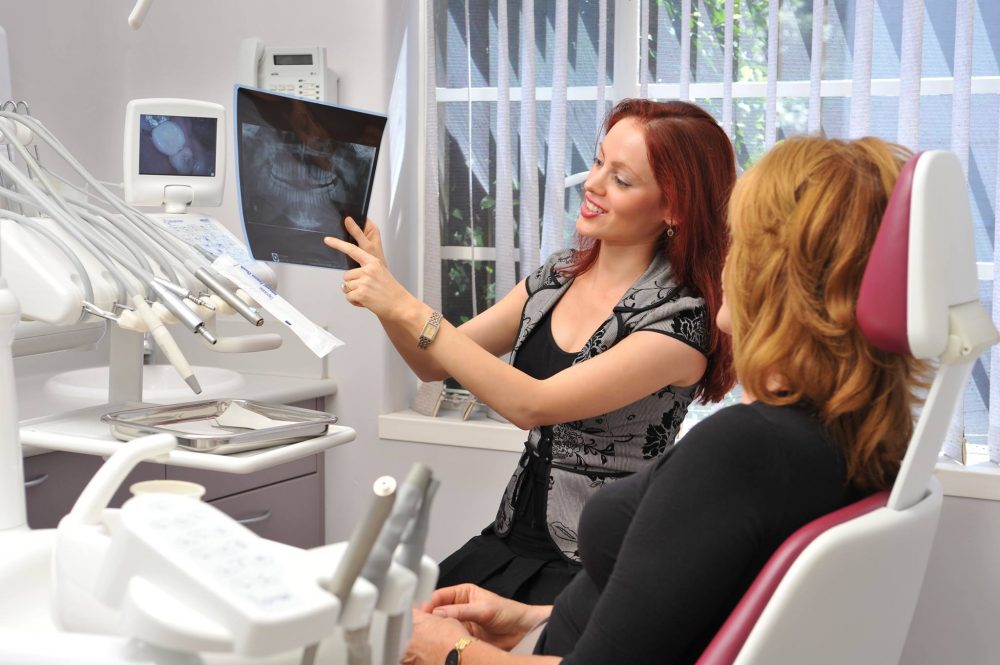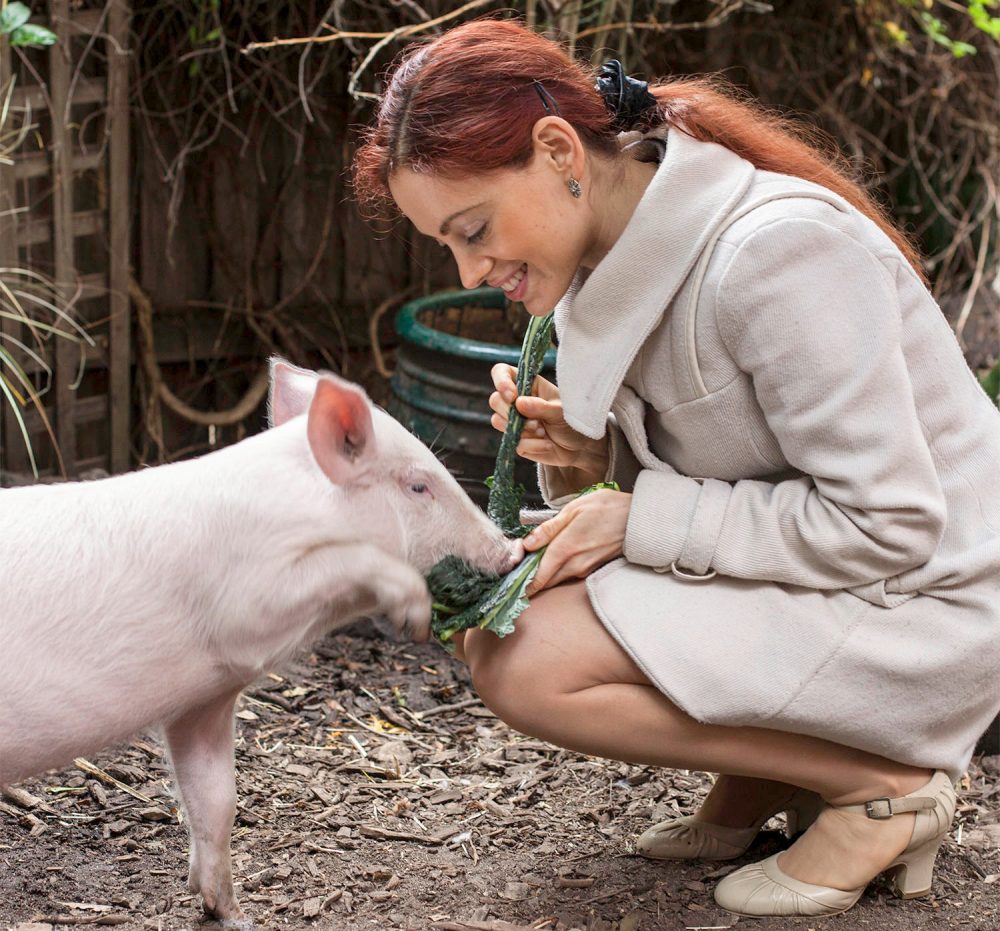Helen Voronina
We talk tooth truth with vegan dentist Helen Voronina.
We talk tooth truth with vegan dentist Helen Voronina.
How and why did you become vegan?
For 19 years before I became a vegan, I was a so-called ‘ethical vegetarian’, oblivious to the cruelty of dairy, leather and eggs. I naively disassociated these from animal suffering. I made the connection between the animals I had a personal connection with and the animals that were presented to me for food at a very young age, but it took several years to stand up to my family and say no to eating flesh. I knew little about nutrition at the time and thought my skeleton would collapse if I stopped drinking milk. It’s only in recent years that I gathered the strength to do more research and after what I discovered, I could never look back.
Does being vegan have any beneficial effects in terms of dental health?
A wholefood vegan diet is beneficial for overall health. However, being vegan provides no specific benefits to dental health.
Are there any dental issues vegans specifically need to be aware of?
Vegans should look out for issues relating to acid erosion and dental decay. Eating lots of acidic fruits and drinking juice and fruit smoothies could cause acidic tooth enamel wear. Everything in moderation applies in this instance.
Fruits are great for your health but limit fruit smoothies to one a day and make it using predominantly veggies with no added sugar. Use stevia instead.
Limit fruits to two to three times a day. It’s best to ‘binge’ on fruit twice a day than to graze on it throughout. Longer acid-free and sugar-free periods will allow saliva to remineralise enamel, neutralise acids and clear sugar.
The worst thing you can do is to brush your teeth straight after acid exposure. You’ll scrub away weakened enamel. Wait a few hours after your last meal and brush your teeth either last thing at night or first thing in the morning before breakfast.
Again, to prevent decay, minimise the frequency of sugar intake. It’s best to limit anything with added sugars, dried fruit, highly sugar concentrated fruit juices (including home made ones with no added sugar) to mealtimes, or even better once a day. Give your teeth time to recover!

Many dental products are tested on animals or contain animal ingredients. Are there equally good vegan alternatives available? What are you recommendations for toothbrushes, toothpastes, dental floss and mouthwash?
I am a pest to supplier companies – always on a mission to make a fuss about cruelty free products. Colgate (Johnson & Johnson), Oral B (Procter & Gamble) and Sensodyne (GlaxoSmithKline) have all been informed that we will not promote their products until they adopt cruelty free production methods. ‘White Glo’ (with fluoride), ‘Red Seal’, and ‘Phyto Shield’ are some of the many vegan alternatives. Most toothbrushes are vegan but I’d only support ethical companies who manufacture them. ‘Radius vegan Cranberry Floss’ is the only vegan floss I’ve been able to find.
Mouth rinses are useless in general so save your money. I recommend good daily oral hygiene using toothbrush and floss. Fluoride mouth rinse can be of help to people with high decay rate. However, a well-balanced, low sugar diet is the best way to prevent dental decay.
As far as dental materials and pharmaceuticals are concerned, I understand that by law they would have had to be tested on animals at some stage. So I have a dilemma… Do I get out of dentistry or make my voice loud and clear to the companies? If I go and do something else, the issues of animal exploitation are consistent across most professions. Besides, who is going to speak on animals’ behalf in dentistry? Dental suppliers think I’m a nut case and often don’t return for their sales pitch. They promise to email me their policy on animal experimentation and I never hear from them.
My practice is a centre for dental implants and associated procedures. As far as graft surgery is concerned I use host bone or human donor bone and skin as opposed to cow or pig bone. Not only are these materials harvested from consenting human donors, but they are far superior and better accepted by the host tissue.
Some animal rights activists argue that humans are natural herbivores because our teeth more closely resemble herbivores than carnivores or omnivores, is there any truth to this?
Well, we are primates and from our comparative anatomy studies our dentition is comparable to our herbivorous relatives. We have rudimentary canines and flat molars for grinding fibrous foods. These are certainly not for tearing flesh. From what I understand, the gastrointestinal system is also more comparable to that of herbivores. I’ve always been puzzled by the ‘omnivore’ category. All animals can eat flesh. My rescued birds would happily devour animal flesh, but what effects would it have on their health? I think the detriment of animal products on human health has been well established.
How have your family and friends reacted to your veganism? Have you influenced anyone else to go vegan?
My family always resisted my vegetarian philosophy and mocked me for years. Becoming a vegan hasn’t been such a blow to them. They still see it as a peculiarity rather than a moral baseline and a healthy lifestyle. Friends don’t seem to care either way. However, I’ve formed new fulfilling friendships with vegans.
I’m so proud of my husband for becoming a vegan. He was the biggest meathead of all. So far the vegan transformation count is four. However, I know many people who are interested so I never tire of education.
How do you feel switching to veganism has impacted your health?
To be honest I haven’t felt the impact. I’ve always tried to lead a healthy lifestyle so I haven’t noticed a difference from switching to veganism. Who knows what damage milk has done? However, soon after becoming a vegan and researching food options I became more aware of nutrition in general and started eating more organic vegetables and wholefoods.

What are some of your favourite tooth friendly vegan meals?
Frozen fruit sorbet with no added sugar that I make from frozen banana, pineapple and mango in my Vitamix. Also, I love home made seitan and chickpea cheese. My non vegan co-workers ask for more. My best tip – cook your favourite vegan desserts with stevia.
Have you encountered any absurd stereotypes, comments or negative attitudes?
Yes. Apparently I have an eating disorder. Another one is that we need animal protein for optimal health. How about, ‘animals are bred for people’ and ‘all nutrients should derive from their natural sources (i.e. iron and vit B12 from flesh)’. ‘Animals are unintelligent’. How ironic!
What do you think are the most effective ways of helping veganism to become more mainstream?
I struggle with answers to this question. I think about it all the time and wonder about how we got here in the first place. What is wrong with our species? Why are we are so greedy and cruel? We are certainly dextrous and have the mind to enable this creativity and dexterity but we have little to be proud of otherwise. Education is a starting point but I don’t believe it alone is a strong enough incentive for people to change unless it’s from a young age.
We need something more drastic to happen. Vegans need to unite forces and overpower in numbers. We are herd animals. Natural leaders can cause the trend for followers. Only then will we have the power to lobby. My wishful thinking is that the government subsidises fruit, veggie and grain farming. History shows that drastic social changes have been ignited by revolutions. The dilemma is that animals can’t fight for themselves. So how do we awake the compassion in people?
The biggest mistake that people make whilst transitioning to veganism is removing food groups from their diet. It’s much easier to substitute cheese and meat with equally satisfying alternatives whilst they are learning.
For gentle dental care visit drhelen.com.au

Marieke Hardy is an Australian screenwriter, blogger, radio broadcaster and reader. In addition to her regular column for ABC's The Drum, she is a senior contributor to Frankie magazine and The Age.

We speak with Lindsay ‘The Doctor’ McDougall, former host of the Triple J breakfast show and lead guitarist in legendary Australian band Frenzal Rhomb.

When not protecting baby harp seals in Canada and Whales in Antarctica as the Sea Shepherd ship doctor, Merryn specialises in children's health. She works with children facing developmental problems like autism and other issues like obesity, behavioural and mental health problems.

Billy Simmonds - winner of the 2009 Mr. Universe title, is an Australian Professional Natural Bodybuilder, Powerlifter, Martial Artist and Vegan. "Vegan Bodybuilding is not only possible, its optimal," he says, "within three years from first lifting weights properly and walking on a Bodybuilding stage as a novice, I had won Mr. Universe and become a Pro Bodybuilder. Steroids? Meat? Not a chance."

Philip Wollen is someone very special. He is a big man with a big heart and most importantly he's BIG on vision. Phil is a philanthropist, OAM, Queens Birthday Honours 2005, Australian of the Year Victoria 2007 and Founder of The Winsome Constance Kindness Trust (WCKT) www.kindnesstrust.com.

Sharon is one of those special people who put themselves on the line to help others. She's a longstanding and highly trained firefighter, often risking her life so others don't loose theirs. Her altruism isn't only to her own species, but it extends to all living beings. Sharon has worked hard for many years helping animals in her spare time. She's practical, down to earth and just the sort of person you want nearby in an emergency.
Comments
As a vegan dentist, what do you think about the claims that proper nutrition can heal gingivitis, cavities and regrow teeth? Here are a few examples: https://www.breakwild.com/nourish/2017/2/22/how-i-healed-my-tooth-decay-naturally
and http://www.ldsvegan.com/2014/07/heal-cavities-vegan-way.html
and https://holistictoothfairy.com/veganscurecavities/
You see this makes sense to me because the body seems to want to heal everything else with proper nutrition, why not teeth? Thanks.
Leave a Comment